

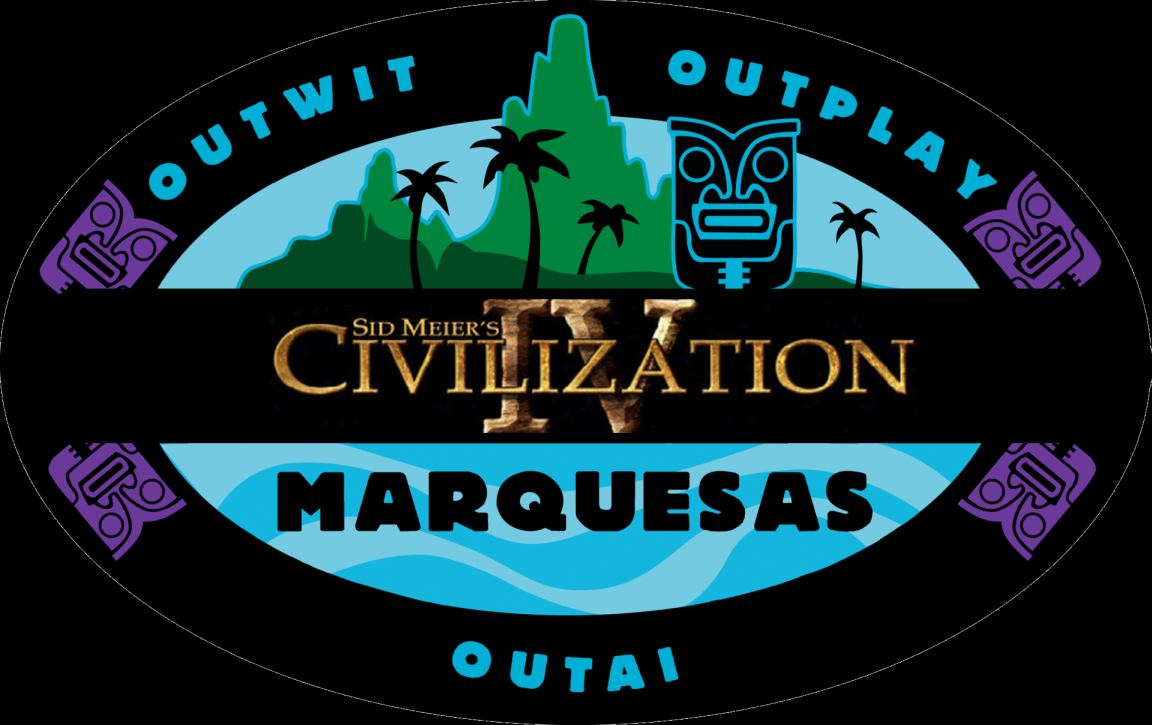
Game Six saw the appearance of one of AI Survivor's biggest juggernauts in the form of Mansa Musa. The Malinese king was the top rated leader over the first three seasons of the competition with five different first place finishes and two trips to the Championship game. He appeared to have drawn a friendly opening round set of opponents and Mansa seemed prime to head back to the playoffs yet again. Joining Mansa Musa were several other high peace weight leaders with good economic traits, namely Darius of Persia and Hatshepsut of Egypt, along with the ever-annoying presence of Sitting Bull. He had been ineffective enough in past years to draw the mocking nickname of "Sitting Duck" for annoying his low peace weight neighbors and starting suicidal wars. On the other end of the peace weight spectrum was Mao Zedong, who didn't bring terribly effective traits to the table yet did manage several trips to the playoffs in past years. Partnering with Mao were two other low peace weight leaders in Brennus and Gilgamesh, and this game seemed to be setting up into a "Good versus Evil" showdown. One of these two groups of leaders would likely survive intact, with the other group probably all being eliminated before the match could be decided.

The biggest question in the early portions of this game was where the religions would fall. We knew that Brennus would land the first one, as the only leader to start the game with Mysticism tech, and he delivered on that expectation with a Turn 7 founding of Taoism. This religion popped up in the second Celtic city off to the west of Bibracte, leaving the potential for a rival faith to appear over in the east. Darius and a surprising Mao Zedong opened the game by researching Mysticism tech, only for Mao to drop out of the race by opting into Pottery as his second tech. This left Darius to claim the other religion, which he chose to pick as Judaism, and it appeared in his own second city to the north of the Persian capital. The presence of religion in this city ended up hurting Mansa Musa, as the initial Malinese settlement had gone to the south and it was close enough that the Persian culture from that Holy City to begin stealing away tiles. It wasn't the best opening position for the heavy, heavy favorite in the picking contest.
No one did anything too stupid with the starting Deity settlers. Mansa and Darius settled towards one another, while Gilgamesh and Sitting Bull did the same up in the north. Hatshepsut chose to push her Creative borders south towards Mao, a move that he countered with an early Stonehenge build (making use of that stone resource) on Turn 40. The biggest initial mistakes on the part of the AI leaders came in the form of barbarian troubles, as Gilgamesh managed to lose his first hand-built settler to the barbarians on Turn 25:
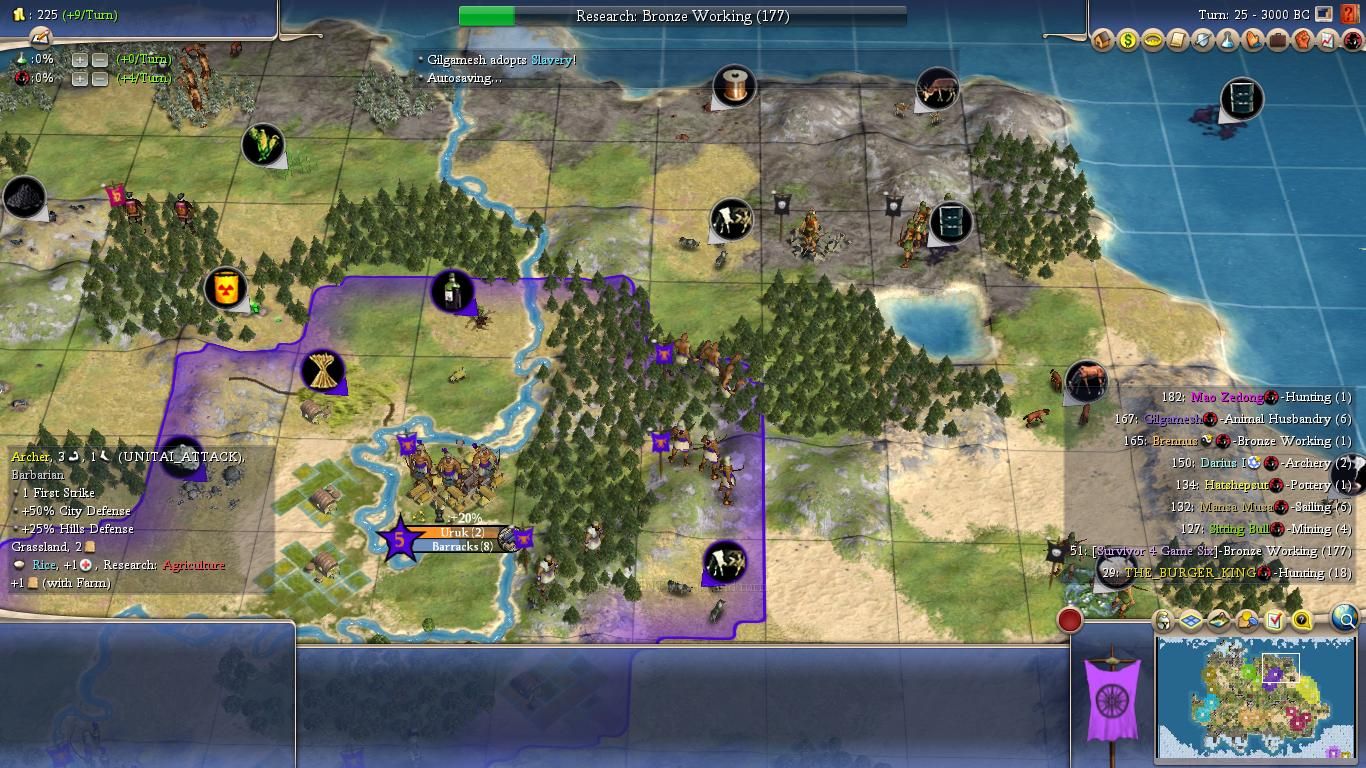
He was guarding the settler with a warrior and founded a city in the tundra, only to have that spot instantly razed on the first interturn by a barbarian archer. The exact same scenario then played out half a dozen turns later, as Darius also lost his first non-free settler to a barbarian archer before it could plant a new city. Darius at least had the excuse of bad luck, as he lost an archer vs archer matchup despite the big combat bonus that Deity AIs get against barbarians. Sigh, these two AIs, Gilgamesh and Darius. Could they ever manage to do something right in an AI Survivor game?
The leader in the early stages of the contest turned out to be Mao Zedong. He had a strong capital paired with those awesome Chinese starting techs (Agriculture/Mining) which allowed him to connect his wet corn and gold resources immediately. Mao built Stonehenge (which helped a lot) followed by the Great Wall (not so much), and then went on to the Pyramids after that. This was likely a mistake, with the stone resource causing Mao to become a little bit too wonder-crazy instead of expanding out across the map faster. He also had an early barbarian city pop up to his southwest that likely prevented early expansion in that direction. We were waiting to see where the third religion would appear, and it turned out that Brennus founded Buddhism as a minority religion in his empire. This prevented a third major religion from appearing and left the game with a bit of a hodgepodge situation, a dominant Taoism in the Celtic territory and a mixture of random stuff elsewhere.
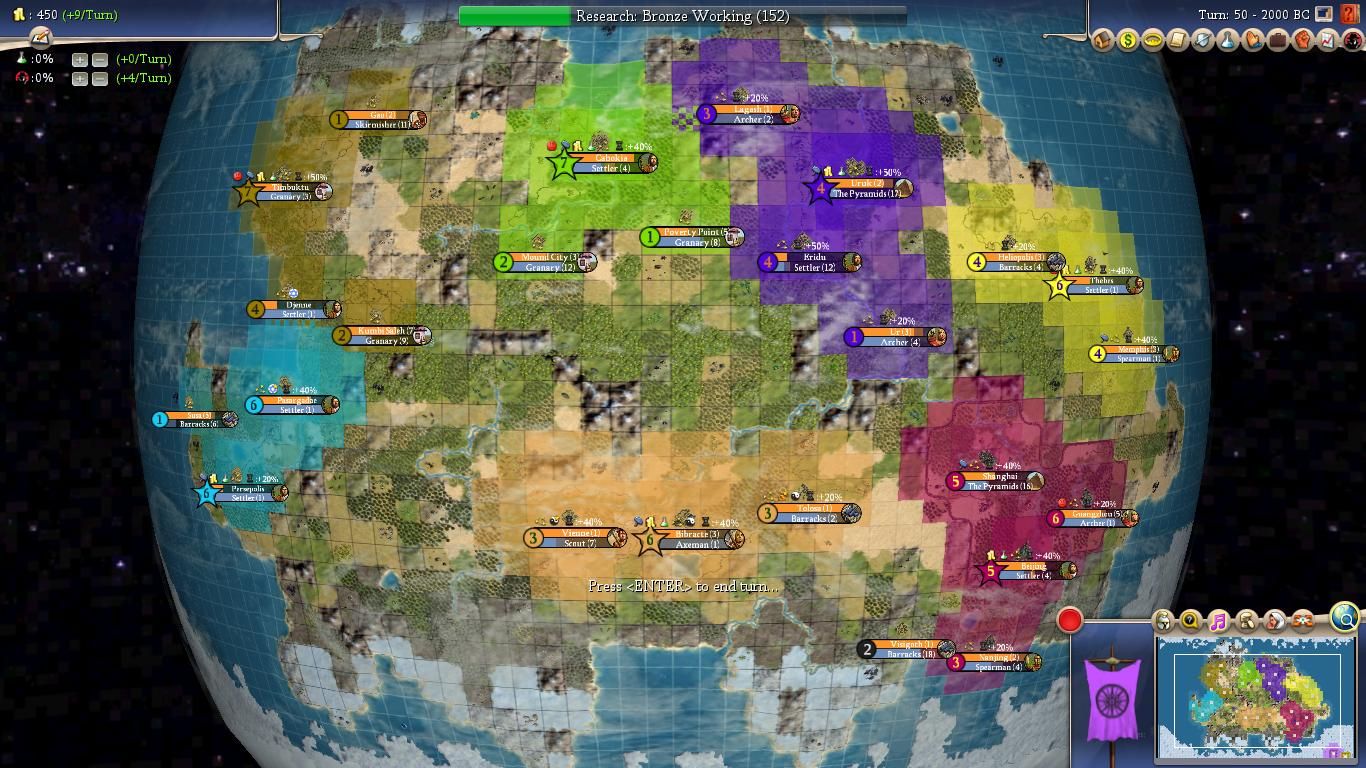
Fifty turns into the game saw the eastern part of the map filling up quickly, while the western side of the map continued to have significant territorial gaps. Mansa Musa's borders were spreading out into a crescent pattern of sorts as he tried to work around the patch of desert to his east. Mansa was struggling to deal with happiness in his cities, as he hadn't managed to get the nearby gold resource into his borders yet and the presence of the Persian Holy City to the south had stolen away an ivory resource. This would have been a good time to build something like the Oracle and grab Monarchy tech for Hereditary Rule happiness, expect that Hatshetsut had already claimed that wonder and used it on Metal Casting. The expansion of Darius continued to be stunted by losing that settler, and he looked to be submitting yet another disappointing performance. Gilgamesh had picked up a reasonable amount of territory given his own lost settler, including picking up access to copper and horse resources, while Sitting Bull was doing his usual thing and picking out a series of poor spots for his cities. It looked to be another case of "The Real Poverty Point" again.
Over the following turns Mao finished his Pyramids build and a whole bunch of leaders began to convert to Taoism. With no other religions present in the east, Celtic missionaries managed to get the Chinese, Egyptians, and Sumerians to convert to their faith. This wouldn't last forever but for the moment Brennus had a bit of a Taoist group working in his favor. Darius was also quietly using his unique unit immortals to pick up some extra territory via barbarian city captures. The +50% combat bonus that immortals get against archers made them ideal for this purpose, and Darius grabbed two cities in the southern tundra this way, plus a random barbarian city in the middle of the map near Gilgamesh. If he could hold onto them, those barbarian captures would help to offset the lost settler from earlier.
The first war of the game broke out on Turn 73, with Gilgamesh attacking his neighbor Sitting Bull. The invasion went nowhere as the Sumerian vultures and swords promptly suicided themselves against the Protective + hillside defenses of Poverty Point. That Native American city had little food and made for a poor city economically, but it proved to be a strong defensive fortification. The more consequential struggle was taking place to the southwest, as we saw Brennus building an army and moving it towards Mansa Musa. The pregame favorite was caught completely by surprise in this invasion:

Walata had been founded only three tiles away from Camulodunum and Mansa didn't have enough time to expand its borders. This allowed Brennus to declare war and capture the city on the same turn, knocking Mansa down to last place on the scoreboard. And don't look now, but there was exactly one skirmisher on defense in the nearby city of Kumbi Saleh. The main thing that Mansa needed here was time, enough time to get his economy up and running until he could leave the other leaders in his dust. But Brennus wasn't giving him that time due to this early war declaration, and the skirmishers that normally would provide safety might not be enough. Where were the city walls for the +50% defensive bonus? If Mansa couldn't get an ally like Darius to come to his aid, he looked to be in real trouble.
The tech leader during these turns was not Mansa Musa or Darius, but instead a surprising Mao Zedong. The gold resource and bevy of floodplains tiles in China had allowed Mao to race out in front of the field, and this caused him to establish the Code of Laws religion in his territory as Christianity. It didn't take too long for him to switch to that faith and drop out of the Taoist group of leaders. Unfortunately for Mao, he did all the work of sieging down the barbarian city to his southwest with a large army, only for a random Celtic ARCHER to get the last hit on the final defender and take the spot. This was a major setback and ended up being a swing of several cities in territory, with the Celts eventually landing everything to the west of Beijing. If it weren't for that highly random outcome, Mao would have ended up with notably more territory.

As we approached the Turn 100 mark, it was clear that Mansa Musa was struggling in his war against Brennus. Kumbi Saleh hadn't offered much resistance when it was captured a dozen turns earlier, and although the Malinese defenders managed to get city walls inside Djenne and put up a good fight, eventually they were overrun by the numerically superior Celtic forces. This knocked Mansa down to just five cities against a Celtic opponent sporting ten cities, and that meant the writing was on the wall for Mansa unless he could enlist some help from elsewhere. But where was he going to find allies? Sitting Bull was fighting against Gilgamesh and now also against Mao, who had piled into the conflict as well. The Native Americans were defending admirably and killing huge numbers of units at the hilltop defenses of Poverty Point. Still, that meant that Sitting Bull wouldn't be riding to the rescue anytime soon. What about Hatshepsut? She was building a series of wonders (the Colossus, the Great Lighthouse, the Hanging Gardens, the Mausoleum) and using a Great Prophet from her obelisk unique building to slingshot the Theology religion, which she founded as Islam. Those handy wonders were helping out Hatty's economy and making her a more formidable opponent, but they weren't doing anything to save Mansa Musa.
The only potential savior for Mansa looked to be Darius, and that was the problem. Darius had exhibited a highly inert AI personality in past seasons, sitting around on his behind not doing much of anything, and that same pattern appeared to be holding true again this year. Even as he continued to do nothing except work on his internal economy, Malinese cities were slowly falling to the attacking Celts. Hatshepsut proved to be more decisive, building the Apostolic Palace (attuned to Taoism) and then invading Mao Zedong along their mutual border. This attack likely saved Sitting Bull for the time being, and it started a gamelong feud between Egypt and China. Hatshepsut would end up capturing a single city from Mao before signing peace.
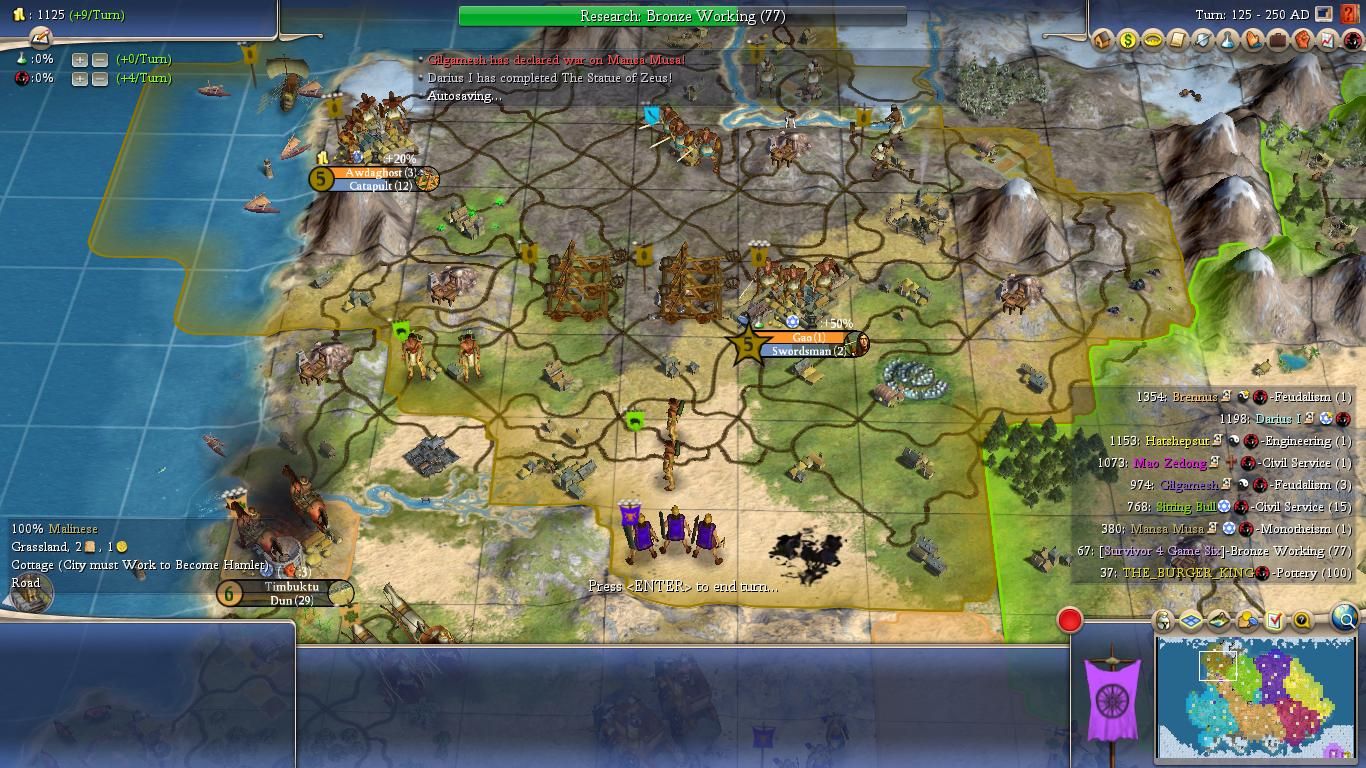
None of this helped Mansa. The massive pregame favorite was slowly bleeding out of the game, and Gilgamesh decided to add another another stab wound by declaring war on Turn 125. Malinese city walls had patched up the blood loss temporarily, however Brennus had reached catapults by now and that meant it was only a matter of time until the death blow landed. Brennus also began using the Apostolic Palace to his advantage, leveraging the fact that Hatshepsut didn't have too many Taoist cities despite building the wonder. The Celts called for a "declare war on the infidels" vote against Mansa Musa, and it fell short by a mere seven votes, 230 out of the 237 needed. Brennus wasn't deterred, however, and he called the same vote again ten turns later. With Mansa having lost more territory, this time the vote went through successfully and Darius + Sitting Bull + Hatshepsut were all forced into a war with Mansa. All of the high peace weight civs were manipulated into attacking Mali, what a disaster for everyone who had Mansa in the picking contest! It didn't take too much longer before Mansa's final cities were taken, and he became the shocking First to Die on Turn 149:

Mansa Musa never managed to get his economy off and rolling in this game. Normally he can hold off early attacks with his skirmishers long enough to gain a tech lead, but Brennus effectively caught Mansa with his pants down and made him pay for it. This was a game where nothing seemed to go right for Mansa, between Darius stealing away his territory with an early Holy City and Mansa failing to take advantage of the double gold resources just outside his capital. Perhaps losing the free Deity starting techs did end up hurting him significantly, as the Mining + Wheel combo that Mali brings to the table isn't very useful. In any case, our pregame favorite was eliminated first, and that meant that the field was wide open for everyone else.
Gilgamesh was the AI leader who landed the final blow against Mansa. There was a reason for this: Darius had finally, belatedly, attacked Brennus half a dozen turns earlier. If he had done so on Turn 102 instead of on Turn 142, or even on Turn 132, it likely would have been enough to save Mansa. Instead we had the top two leaders on the scoreboard duking it out with one another for supremacy. They each traded a border city back and forth before Brennus used the Apostolic Palace to vote through a "stop the fighting amongst our brothers in faith" resolution. This was good timing for Brennus since his forces were pretty gassed from the long war against Mansa. The constant use of the Apostolic Palace by Brennus ended up becoming a huge factor in this game, despite him not even building the wonder. He was the only one running Taoism as a state religion at this point, with Darius having gone to Free Religion, Hatshepsut and Gilgamesh in Islam, Mao running Christianity, and Sitting Bull in Judaism. There were no clear religious alliances in this game, just Brennus leveraging his Taoism repeatedly in the Apostolic Palace.
We had no interval of peace following Mansa's destruction as another round of wars broke out. Hatshepsut went back to war with Mao again, another conflict that proved largely indecisive aside from Mao recapturing the border city he had lost in the last war. Gilgamesh initiated another war with Sitting Bull, and although that looked to be another stalemate at first, it turned into a hotter conflict when Brennus also invaded the Native Americans. He turned to the Apostolic Palace for assistance immediately:
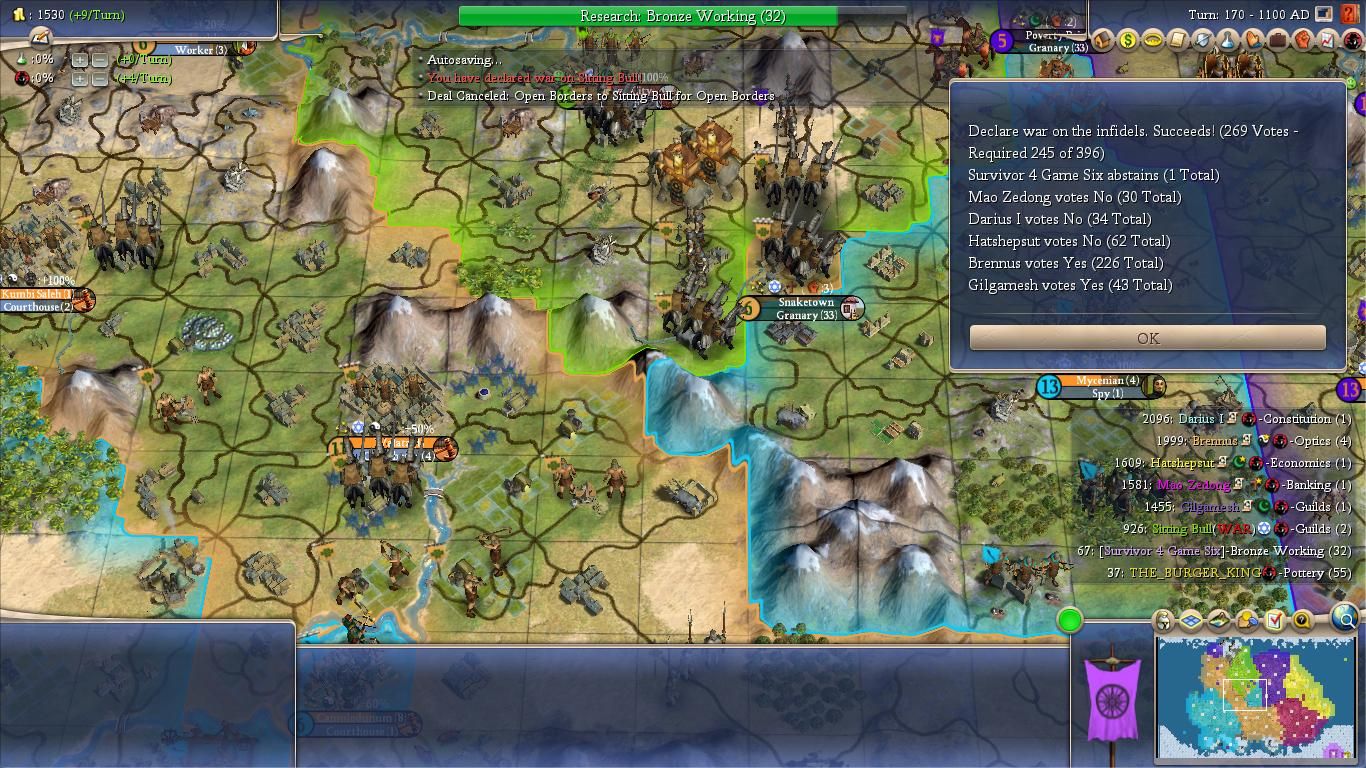
And with a little bit of help from Gilgamesh, it was enough to vote through the crusade resolution against poor Sitting Bull. This pulled Darius and Hatshepsut and Mao into the war against the Native Americans, driving our war declaration counter ever higher in the process. With all of these AP-forced conflicts we were going to end up with some kind of crazy high number before the end. It certainly looked as though Brennus would swallow up most of the Native American territory and continue to snowball his lead in territory over the rest of the field. However, Darius had already been plotting war against the Celts before the AP resolution went through, and therefore he still launched an attack against Brennus five turns later. (Normally the AI will not start a new war if it's already in a war - this was an exception to that rule.) This led to the usual trading of border cities between Darius and Brennus, with great loss of life on both sides. Neither was strong enough as yet to punch through and begin taking the core cities of the other side.
The real winner in all of this proved to be Gilgamesh. He'd been an also-ran nonentity for most of the game, futilely banging his head against the Native American defenses at Poverty Point, but Gilgamesh turned out to be in the perfect position to capitalize on this latest Apostolic Palace crusade. Brennus decimated Sitting Bull's field armies and then had to turn south to deal with Darius, allowing the Sumerians to siege down and capture the defending cities. In rapid order they were overrun and Gilgamesh ended up with half a dozen more cities for his trouble:
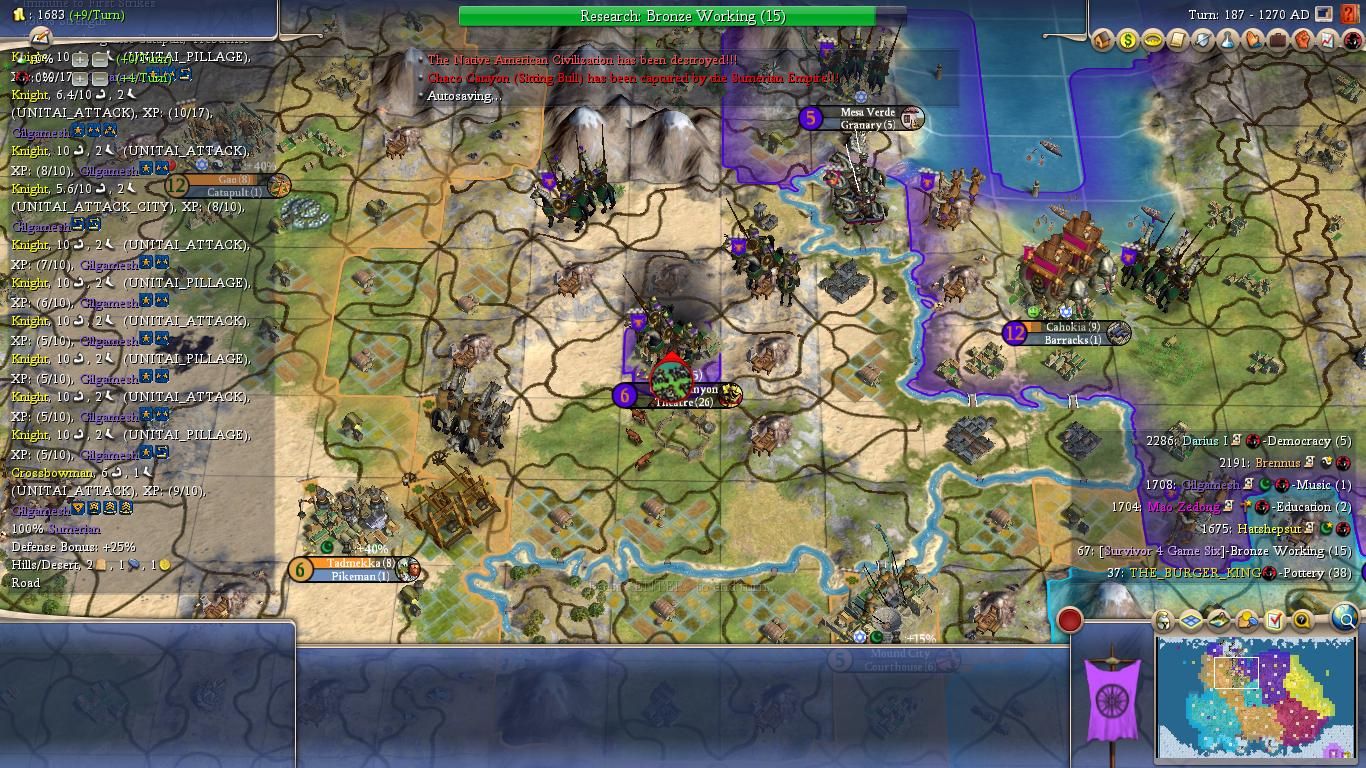
Sitting Bull ended up being just as useless in this game as his past games, despite having an absurdly strong capital city. All that he can do is frustrate someone else's winning ambitions, never serve to win the game on his own. (That's a pretty good summary of the terrible Protective trait in general.) We were now left with a game state in which Darius and Brennus were competing for the top spot, and the other three leaders were roughly tied in third place. At face value, it seemed that Brennus was the favorite to win the game. All three of the low peace weight leaders were still alive while two of the high peace weight leaders were off the board. Hatshepsut's diplomatic position seemed dicey in the long run, and if she were to fall then Darius would be left with a potential 3 vs 1 situation. However, there was one crucial element that pictures of the map failed to convey, and that was the respective technology situation between Darius and Brennus. The Persians with their awesome Financial/Organized traits were ahead in tech:
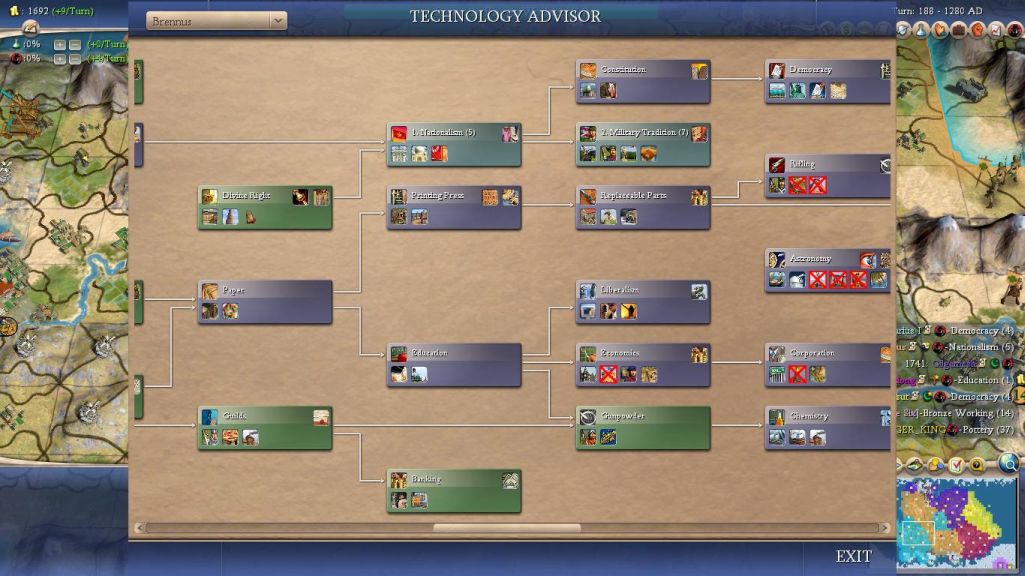

Make that extremely far ahead in tech.  If there was one critical weakness on the part of the Celts, it was a failure to build an adequate economy. Brennus had been in one war or another since the early stages of the game, never stopping to develop his infrastructure and get his research off and running. This was in contrast to Darius, who had spent many long years doing nothing but constructing every building imaginable in his cities. In effect, Mansa and Sitting Bull had been sacrificed to buy Darius enough time to get his economy into powerhouse mode. He was essentially a whole era ahead of Brennus at this point, with rifles and cavalry unlocked whereas Brennus needed a dozen more turns just to reach cuirassiers. Rifling tech was... a long away away for the Celts.
If there was one critical weakness on the part of the Celts, it was a failure to build an adequate economy. Brennus had been in one war or another since the early stages of the game, never stopping to develop his infrastructure and get his research off and running. This was in contrast to Darius, who had spent many long years doing nothing but constructing every building imaginable in his cities. In effect, Mansa and Sitting Bull had been sacrificed to buy Darius enough time to get his economy into powerhouse mode. He was essentially a whole era ahead of Brennus at this point, with rifles and cavalry unlocked whereas Brennus needed a dozen more turns just to reach cuirassiers. Rifling tech was... a long away away for the Celts.
This is one of the biggest military jumps on the whole tech tree in Civ4, the leap from medieval units up to rifles and cavs, and there's very little that an opponent can do if they find themselves fighting with strength 8 units against strength 15 units. Brennus had a much larger army in terms of numbers but he was caught on the wrong side of this technological divide. The Persian and Celtic armies met on the field of battle, and the rifle-touting Persians inevitably prevailed:

Brennus was in the process of sieging one of the Persian cities with a big stack of 50 units. Darius hit it with his cavalry and over a series of turns wiped out that stack to a man. This was the biggest turning point in the game: Darius had reached a position of tech surpremacy and Brennus would never be able to mount a serious challenge to him again. Brennus managed to buy a much-needed interlude of peace by voting though another "stop the war" resolution in the Apostolic Palace, but the damage was done. By the time that Brennus could reach Rifling tech, Darius would be up to Assembly Line and reach another higher tier of military units once again. The powerhouse AI leader in this game had decisively shifted.
Off in the east, Mao had renewed his long-running feud with Hatshepsut and this time managed to punch through the border cities to take the Egytian capital:

Hatshepsut was trying to cement her own demise by doing the thing where she researched every imaginable tech other than the ones that would save her. She had picked up Democracy, Corporation, Communism, and Physics - but not Rifling tech, the one that would grant her the units needed to defend against the Chinese. Mao wasn't much better in this regard, as he was also following the same tech path. Both of them continued to fight with medieval units for no clear reason despite having more than enough research power to reach the next generation of military tech. But Hatshepsut had lost too many cities at this point and lacked the production to compete with Mao any longer. The Chinese were slowly winning their endless struggle against the Egyptians. It was to Hatty's credit that this had taken so much longer than the picking contest had expected, with most people expecting her to be the first to die. However, she was still losing the war and it seemed that Hatshepsut was finally on her way out.
If there was a hope for Brennus to turn things around against Darius, it involved an alliance together with low peace weight leader Gilgamesh. Instead we ended up seeing just the opposite: Gilgamesh declared war on Brennus on Turn 228. The two of them were running difference religions, had border tensions from a bunch of overlapping cities, and ironically, Gilgamesh and Darius had a big "mutual military struggle" bonus from fighting together against Mansa Musa and Sitting Bull. Imagine that, Darius reaping diplomatic benefits from the Apostolic Palace-forced wars against his putative allies!  It looked like Brennus was about to collapse as he lost two cities almost immediately:
It looked like Brennus was about to collapse as he lost two cities almost immediately:

But then Brennus used the Apostolic Palace to stop the wars taking place, gaining an undeserved peace treaty for his efforts. He continued the diplomatic shenanigans by getting the city of Gao reassigned to him, and then five turns later, also voted to have the city of Tadmekka returned to him. Just like that, the two invasions were ended and the cities lost in the war were forcefully gained back. It was the Apostolic Palace at its absolute worst: no one voting along with Brennus, the Celts simply getting whatever they wanted due to the fact that no one else had Taoism present in more than a handful of cities. We had a question on the Livestream: how was this different from Justinian leveraging the Apostolic Palace a few weeks earlier, something that I'd written about more positively? The big difference was that Justinian genuinely had a religious alliance of Christian civs in that game, three other leaders working together with him in concert. The Apostolic Palace actually made sense in that game as a diplomatic tool. In this game, no one else practiced Taoism and Brennus was simply voting for whatever he wanted, with no one else able to do anything about it. It's ridiculous that a single wonder can grant a leader that much control over the diplomacy when they don't have anywhere close to a majority of the game's population. It's fine when a leader can convince 70% of the game's people to go along with their resolutions, not so much when a single leader with 25% of the game's population gets to override everyone else.
Anyway, Brennus was able to cheese his way into survival for the moment. Hatshepsut had no such luck on her side though, as Mao systematically captured the remaining Egyptian cities. One of them was taken by a random wandering Celtic cavalry unit, and Brennus ended up with a single city far off in the east. Everything else went to the Chinese, including the elimination credit:
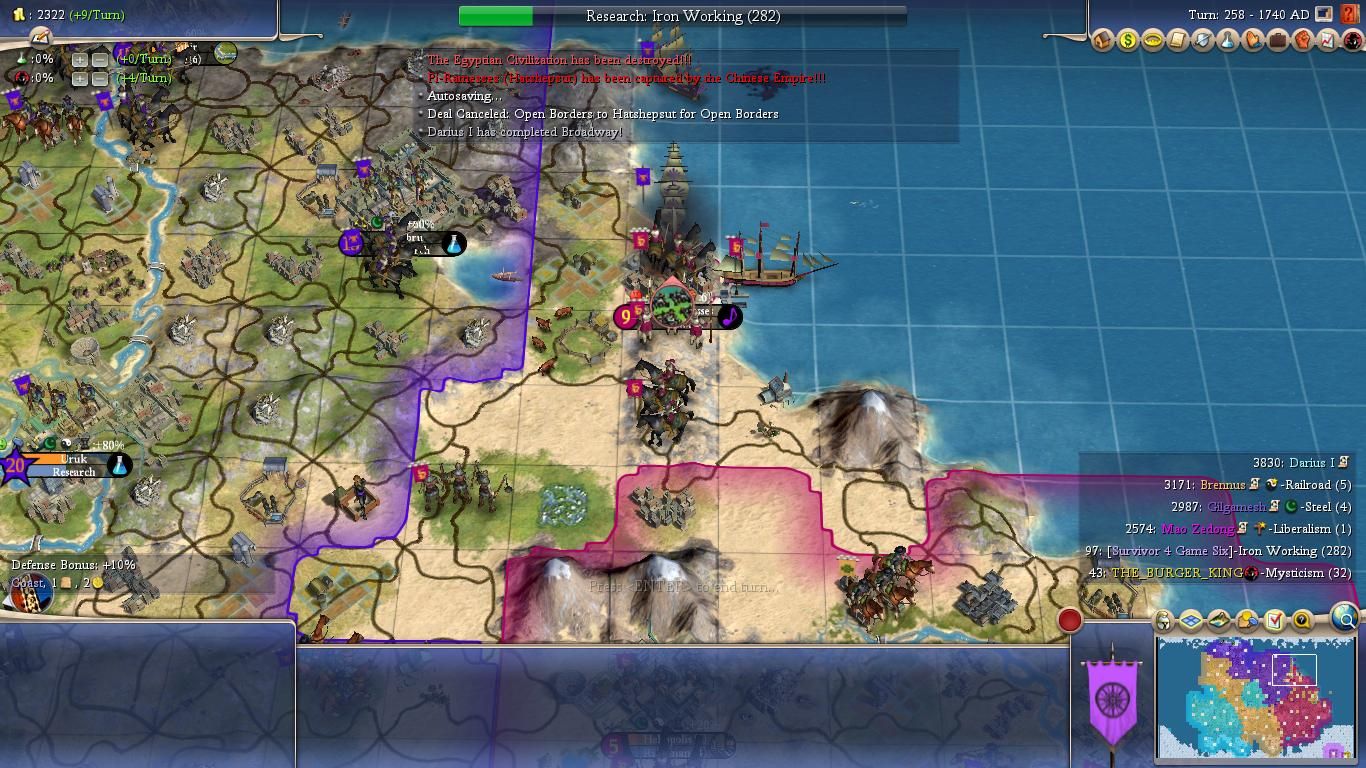
Hatshepsut survived much longer than expected and played a pretty solid game. She was undone by her peaceful tech preferences and her failure to build enough units. Her main accomplishment in this game was to drag Mao Zedong down with her, as the early game leader had spent long centuries on end pestered by one Egyptian invasion after another. It was largely due to Hatshepsut that Mao hadn't been able to snowball his early game lead into a later position of strength. He was the weakest remaining leader and far behind the tech dominance of Darius.
As we moved into the later stages of the game, it seemed more and more likely that Darius would be the winner via the spaceship. He was a long distance away from a military victory condition and hadn't shown any interest in chasing after culture. There was also too much mutual hatred built up in this game for the diplomatic route via the United Nations. The bigger question was who would claim the runner-up spot and who would be able to survive to the finish. Brennus was attacked again by Gilgamesh on Turn 260, only for another Apostolic Palace vote to end the war a few turns later. Was the whole game going to play out this way? It was more than a bit ridiculous that Brennus had been able to get out of war after war via the Apostolic Palace, a wonder he hadn't even built. He faced a more serious test starting on Turn 282:

Darius launched a new invasion backed by tanks, at the same time that Mao bizarrely chose to attack Gilgamesh. That latter war felt like a giant mistake given the territorial advantage held by the Sumerians. As for our main war, there was little chance that Brennus could survive barring a new Apostolic Palace end to the conflict. While Brennus had just researched Assembly Line tech he hadn't had time to construct his factories and power plants yet, nor did he have enough time to upgrade his rifles into infantry. Darius was packing tanks and wasn't far away from the rest of the Modern era suite of military units, attackers that would have little trouble cutting through the Celtic defenders. The Persians finished the Manhattan Project within the first few turns of the war and Darius wasn't shy about using nuclear weapons:
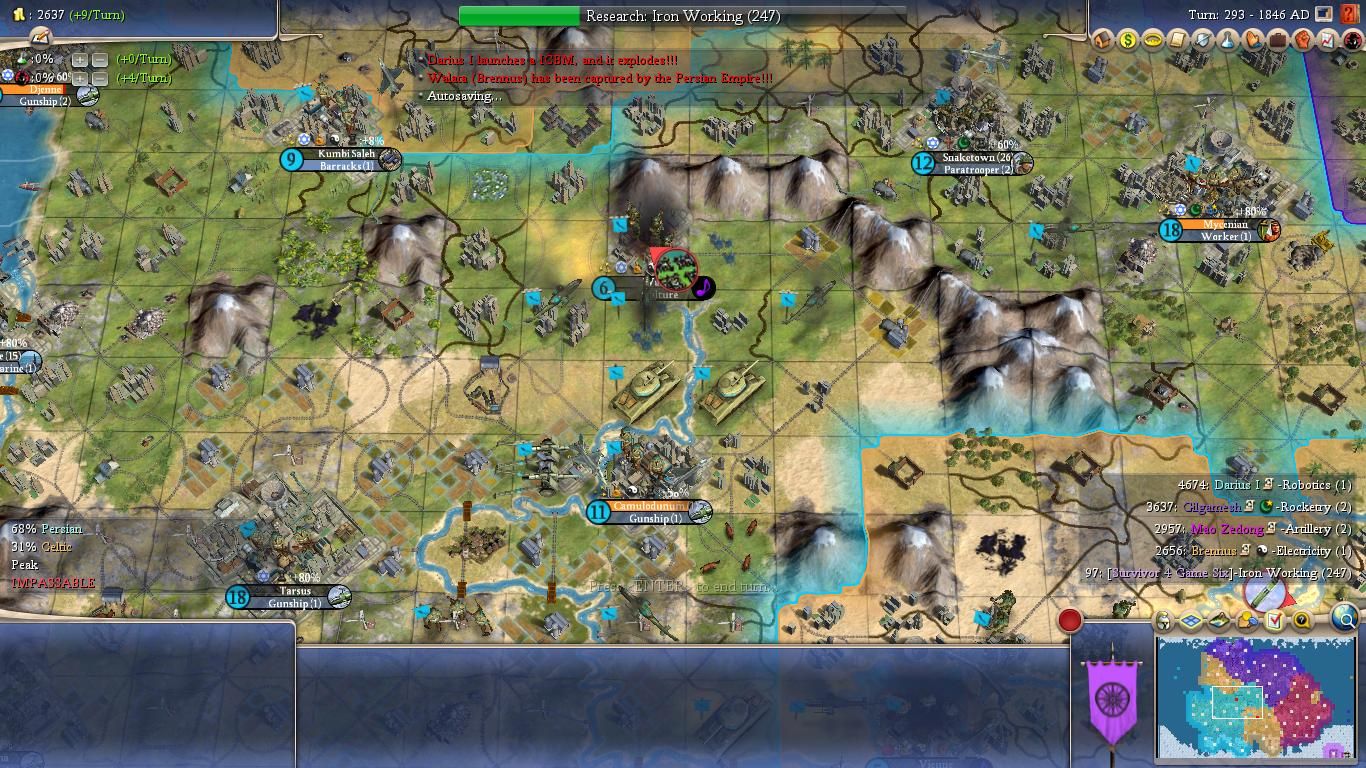
Brennus was nowhere close to Fission tech for his own nukes, and even further away from being able to construct the SDI. He had no defense at all against the incoming nuclear attacks and fallout rained down from the heavens in coordination with the invading Persians. Darius first punched through a connection to the Persian cities in the middle of the map that had never come under attack, then began rolling up the flanks to the north and south. We were unable to see the votes in the Apostolic Palace now, as Darius had finished the United Nations and therefore introduced everyone to the observer AI civ. We had to deleted Charlemagne from the game and remove the AP religion from the human observer civ, thereby making it impossible to see the AP resolutions. There was a United Nations resolution that stopped the war between Gilgamesh and Mao, which was predictably going poorly for the Chinese. However Darius controlled the UN and refused to stop his war against Brennus, and apparently the Celtic leader had lost too many cities to be able to cease the conflict via the Apostolic Palace. This meant that he was doomed, and the Persians lost no time in running over one city after another.
Eventually Brennus was left with only a single city, the location in the far east that he'd captured from Hatshepsut. This spot couldn't be reached by Darius, as it was completely surrounded by Chinese culture and Mao didn't have Open Borders with Darius. Was Brennus going to survive to the Wildcard game due to this one random spot that he'd captured? No, as it turned out: Gilgamesh started a new war with Mao on Turn 313. We watched to see if Gilgamesh could capture enough Chinese cities to open a path to Brennus, and within a dozen turns the path was clear. Even as the Persian spaceship was en route to Alpha Centauri, Darius tracked down the final lair of his opponent and eliminated him from the game:

It was quite a dual between Brennus and Darius throughout this match, with the latter individual lasting long enough for his superior economic traits to deliver him the victory. It looked like Brennus was the favorite to win for much of this game, and his very late elimination was a sour ending to an otherwise impressive game. With just a little bit more luck Brennus could have been the one taking home the prize. His inability to get a true Taoist coalition running in this game was a big part of his downfall.
Time was rapidly running out now as the Persian spaceship neared its destination. Gilgamesh had researched his own nuclear weapons and he was raining down hellfire on the Chinese defenders. City after city was taken by the Sumerian invaders until Mao was left with a runt state on the southern coast. As fast as this war was going though, it wasn't going to be fast enough. When the Persian spaceship touched down on Turn 333, there were still a bare handful of three Chinese cities left:
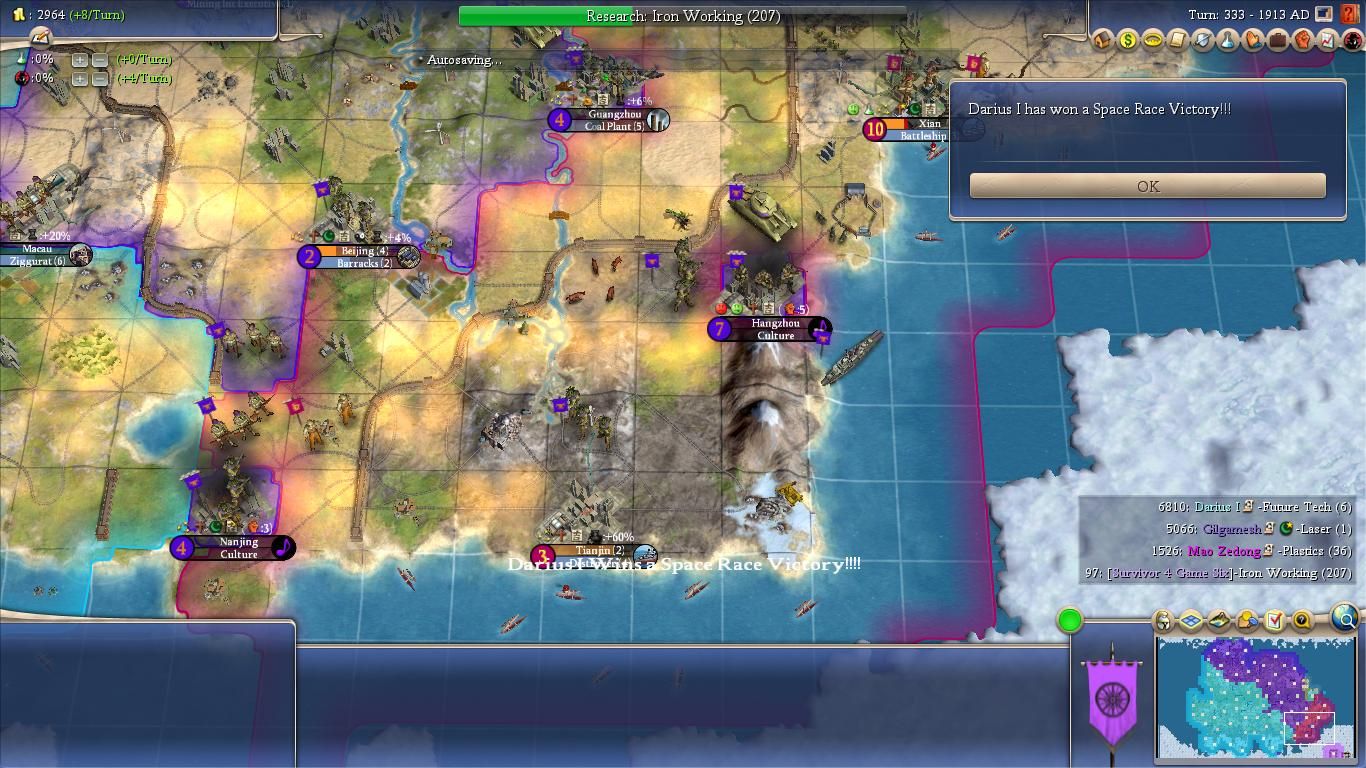
Mao would have been gone in less than ten turns, and he was extremely fortunate to survive and reach the Wildcard game. We were almost left with just Darius and Gilgamesh still standing. It was a wild ending result given that both of these leaders had done very little in past seasons, and furthermore had both lost settlers to the barbarians in the early stages of this game. We saw how Darius managed to take the top spot, with Mansa Musa and Sitting Bull buying him enough time to get his economy snowballing ahead of the rest of the field. Darius essentially played the role that we expected Mansa to hold, the leader who wasn't ahead on territory but it didn't matter due to his insane teching power. As for Gilgamesh, he had been a savvy opportunist in this match, gaining more than anyone else from the destruction of Sitting Bull and largely riding the coattails of Darius to make territorial gains against Brennus and then Mao after the hard work had been carried out by other leaders. Gilgamesh didn't so much play a great game as find himself in the right place at the right time again and again.
This game certainly did not follow the expectations of the picking contest. We'd have to wait and see if Darius and Gilgamesh could continue their newfound successes in the playoff round, or if they would return to their prior history of failure against tougher opponents.



